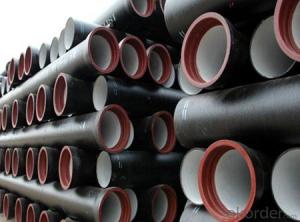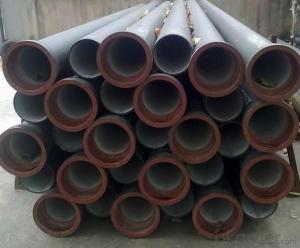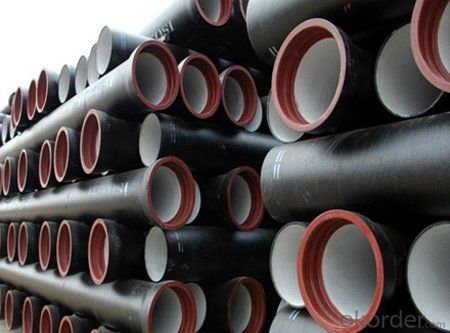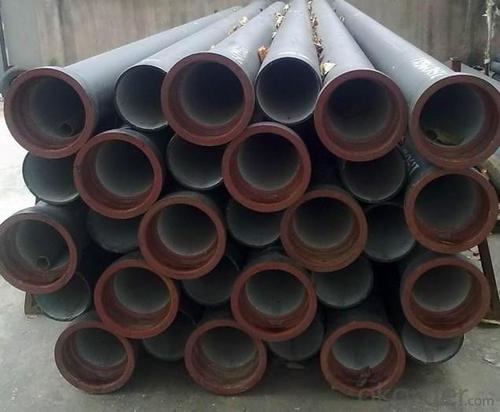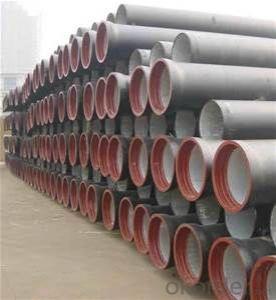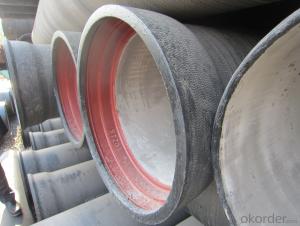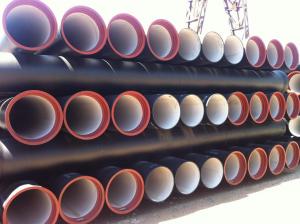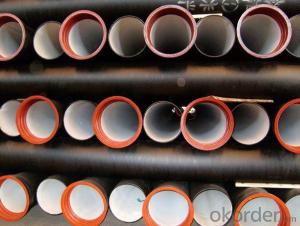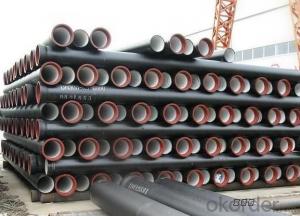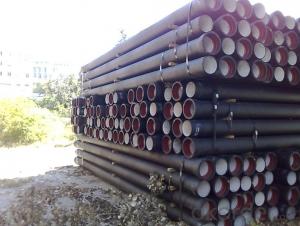Ductile Iron Pipe of China DN500 EN545/EN598/ISO2531
- Loading Port:
- China main port
- Payment Terms:
- TT or LC
- Min Order Qty:
- 25 m.t.
- Supply Capability:
- 200000 m.t./month
OKorder Service Pledge
OKorder Financial Service
You Might Also Like
1,Ductile Iron Pipe Description :
1) Pipes confirm to ISO2531,K9 class,T type joint,6m long,with inside cements lining conform to ISO4179, outside Zinc spraying(130g/m2) and bitumen coating(70μm) conform to ISO8179.
2) Pipe ends: Spigot and socket ends, with 100% SBR rubber gaskets accoding to ISO4633
3) we can do third party inspection according to customer's request.
4) Our products have been sold to many international market, such as Middle East and South East Asia and Africa.
2,Main Features of the Ductile Iron Pipe:
•High yield strength
•High tensile Strength
•High corrosion resistance
•Pressure Resistence
•Anti-corrosion
•Installation is convenient
•Satisfy the highest hygienic standards
• Chemical checking
• NDE after rough machining
• Mechanical testing after heat treatment
• Final NDE,dimension inspected
• Full Q.A document as per client request
• Quality: we have full set quality control system to guarantee the best quality.
• Inspection: inspect in house, all our products must be checked 3 times before packing
• In-house Foundry
• Third party inspection available upon requirement
• To be your preferred partner
3,Ductile Iron Pipe Images:
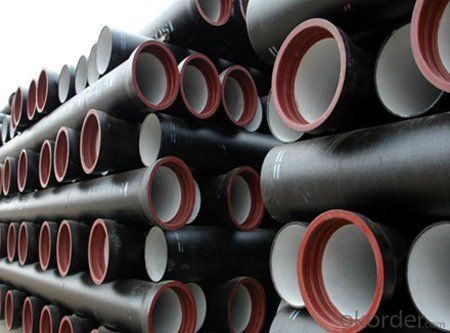
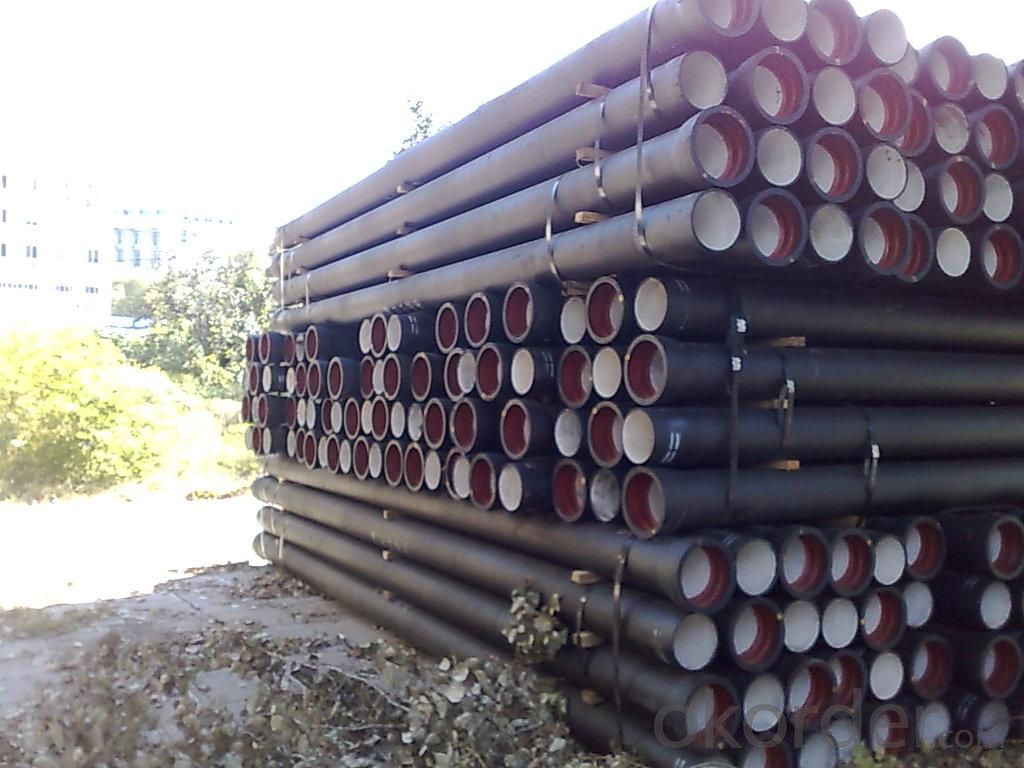
4. Ductile Iron Pipe Specification
Processing service: Beveling, Threading, Slotting, Cut-to length, Bends, Quench and Temper, Fabrication, Double-jointing and On-site assistance
Documentary: MTC, material certification,Origin certification, CI or PI,Test Report, export licence, handling order, B/L,insurance policy,shipping instructions, contract, packing list etc.
Specification& Payment terms
Internal lining: ductile iron pipes shall have an internal cement mortar lining in acc with ISO4179.
External coating: ductile iron pipes shall be externally coated with metallic zinc spray plus a further layer of resin painting to ISO8179.
Gasket: 100% SBR/NBR/EPDM rubber gasket in accordance with ISO4633.
Packing: ductile iron pipes from DN100 to DN300 be bundled with steel belts, others are in bulk.
Payment term: L/C, T/T.
Packing: In bulk vessel or in container
5.FAQ:
We have organized several common questions for our clients,may help you sincerely:
1.Q: Why would you choose ductile iron pipe rather than other pipe materials?
A:The reasons are obvious for that not only ductile iron pipe possesses the inherent strength and flexibility of ductile iron, combined with proven corrosion protection systems, but also the cost savings can be achieved from design to installation and commissioning.
2.Q:Why can you guarantee the inner of pipes can’t be corroded?
A: High alumina cement mortar lining and sulphate-resistant cement mortar lining. These two special linings are applicable to inner anti-corrosion for sewage pipes, improving resistance to erosion of the sewage components.
C
- Q: Ductile iron pipe joint damage, water leakage, want to see the connection with other pipe fittings, how to operate?!
- The ink tube is really not good. Oh, have you tried blocking it with cement or plugging it with putty?Just pick up PE haha
- Q: What are the specifications of cast iron pipes?
- The nominal diameter of the continuous grey cast iron pipe is 75~1200 mm. It adopts the form of socket type or flange disk interface. It can be divided into two kinds of flexible interface and rigid interface according to function. The length of the straight pipe is 4 meters, 5 meters and 6 meters. According to the wall thickness, LA, A and B are divided into three grades. The nominal diameter of the centrifugal cast iron pipe of the sand mould is 200~1000 mm, the effective length is 5 meters and 6 meters. According to the wall thickness, it is divided into two grades: P and G. High strength, good toughness, thin tube wall, little metal consumption, and can bear higher pressure,
- Q: Qianwei County ductile iron pipe which tool to use cutting convenience?
- Cutting the ductile iron pipe by grinding is grinding and cutting the ductile iron tube continuously by grinding wheel until it breaks. To cut ductile iron pipes by grinding cutting method, the cutting parts should be crossed at first so as to avoid deviation during cutting. Place the drawn ductile iron tube in the cutting machine and fix the ductile iron tube and clamp it with a built-in clamp. Next, start the cutting machine and gradually press the handle of the cutting machine. The grinding wheel cuts into the ductile iron tube until the ductile iron pipe is cut off. When exerting pressure on the handle, do not force too hard at once, otherwise it will cause the grinding wheel to break. In the operation of the machine, the operator must not stand on the side of the grinding wheel, so as to avoid accidents. When the wheel appears in cutting, vibration, shaking, uneven phenomenon, should immediately stop the operation, check whether there is the wheel gap, if damaged, must be promptly replaced, to ensure safety and normal. Good cutting ductile cast iron pipe section, if there is to prevent the use of burrs, can be removed by grinding or machining file.
- Q: There are several forms of flexible interfaces for Spigot Cast Iron Pipes
- Japan's Kubota ductile mechanical interface, in recent years has been introduced to China. As in the Beijing water pipeline construction from the Miyun reservoir to the Huairou reservoir, the use of a large number of nodular type DN2600mmK mechanical interface of cast iron pipe.The mechanical interface of ductile iron pipe is divided into A and K. The tubes and fittings are made of ductile iron, straight pipes, screws, bolts and rubber rings.The mechanical interface has good sealing performance. When the water pressure reaches 2MPa in the test, there is no leakage. The axial displacement and the angle of folding all reach a high level, but the cost is higher.
- Q: Are ductile iron pipes suitable for installation in rocky or hard soil conditions?
- Yes, ductile iron pipes are suitable for installation in rocky or hard soil conditions. Ductile iron has excellent strength and durability, making it highly resistant to external pressures and impacts. It can withstand the challenges posed by rocky or hard soils, ensuring reliable and long-lasting performance.
- Q: How can the cast iron pipe of the ductile iron pipe be repaired?
- First of all, to see whether the manufacturers do elbow pressure did not reach, if it is. That can only be replaced, if not, with a cast iron electrode welding repair.By the way, ductile iron can only be welded and not welded.
- Q: How do ductile iron pipes handle water hammer?
- Ductile iron pipes possess excellent resistance to water hammer, which is the sudden increase in pressure and velocity of water flow in a pipe system. This occurrence happens when there is an abrupt change in water velocity, like the sudden closure of a valve or the immediate shutdown of a pump. The design of ductile iron pipes enables them to withstand high-pressure surges caused by water hammer. Their increased strength and flexibility allow them to absorb and dissipate the energy generated during these pressure surges. The material's ductility permits the pipe to undergo slight deformation when impacted by water hammer, preventing the pipe from rupturing or breaking. Moreover, ductile iron pipes possess inherent damping properties that make them more effective at absorbing and dissipating the energy of water hammer compared to other pipe materials. This aids in reducing the intensity and duration of pressure surges, thereby minimizing potential damage to the pipe system and its components. Furthermore, ductile iron pipes often come equipped with various fittings and accessories that further enhance their capability to handle water hammer. These include specialized joint designs like restrained joints or flexible couplings, which provide additional flexibility and resistance to pressure surges. In summary, ductile iron pipes are specifically engineered to address the challenges presented by water hammer. Their strength, flexibility, damping properties, and specialized fittings make them an ideal choice for applications where water hammer is a concern, offering a reliable and durable solution for water distribution systems.
- Q: Can ductile iron pipes be used for underground river crossings?
- Yes, ductile iron pipes can be used for underground river crossings. Ductile iron pipes have excellent strength and durability, making them suitable for various applications, including underground river crossings. They have high tensile strength and are resistant to corrosion and external loads, making them an ideal choice for such installations.
- Q: How much is the manual installation fee of ductile iron pipes from 100 to 150 per metre?
- According to the various connection modes after the installation of artificial fee at =8.7~9.0 yuan (about /M this is pure artificial installation fee, no other costs to calculate, if packet labor costs and construction should be appropriately increased when installed).
- Q: How do ductile iron pipes perform in freeze-thaw cycles?
- Ductile iron pipes perform well in freeze-thaw cycles due to their high tensile strength and flexibility. Unlike brittle materials, ductile iron can withstand the expansion and contraction caused by freezing and thawing without cracking or breaking. This makes them a reliable choice for water and sewer systems in regions with harsh winter climates.
Send your message to us
Ductile Iron Pipe of China DN500 EN545/EN598/ISO2531
- Loading Port:
- China main port
- Payment Terms:
- TT or LC
- Min Order Qty:
- 25 m.t.
- Supply Capability:
- 200000 m.t./month
OKorder Service Pledge
OKorder Financial Service
Similar products
Hot products
Hot Searches
Related keywords
